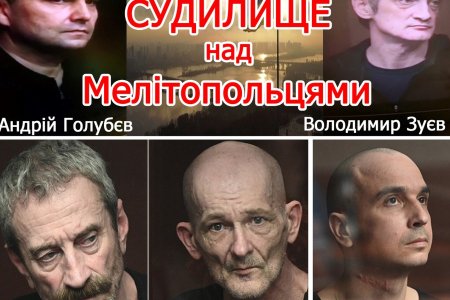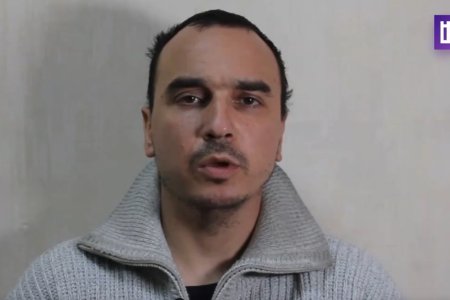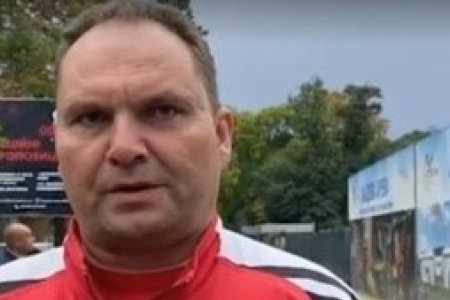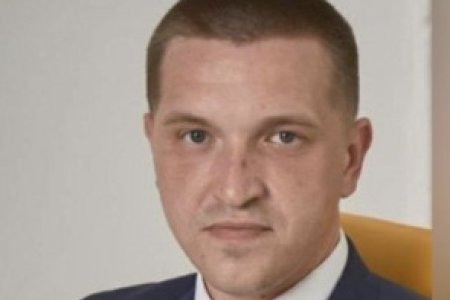
A Russian prosecutor has demanded sentences of up to 16 years against five Ukrainian civilians from Melitopol abducted soon after Russia’s full-scale invasion of Ukraine and tortured to extract supposed ‘confessions’. Russia concocted insane and deeply cynical ‘international terrorism’ charges, although any ‘international aspect’ to the entirely unproven ‘terrorism’ charges, was provided solely by an invading Russian army.
The ’trial’ of the five men - Andriy Holubiev, Ihor Horlov; Yury Petrov, Volodymyr Zuyev and Oleksandr Zhukov – is coming to an end three years after the men were abducted from Melitopol and almost two years after the ‘case’ was passed to the Southern District Military Court in Rostov. The length of the trial, which began on 18 June 2023, is linked solely with the huge number of Ukrainian prisoners of war and civilian hostages against whom Russia is illegally concocting charges. The court itself has been churning out long sentences against Ukrainian political prisoners since 2014, and there are, unfortunately, no grounds for expecting the only right verdict, namely a full acquittal, from presiding ‘judge’ Sergei Mikhailovich Gorelov and two colleagues.
During the court ‘debate’ on 14 April 2025, the Russian prosecutor claimed that the charges had been proven and demanded a 16-year sentence against Oleksandr Zhukov; two sentences of 15 years and 10 months against Andriy Holubiev and Volodymyr Zuyev, with a 15-year sentence demanded against Ihor Horlov and 14-year 10-month sentence against Yury Petrov. Given the flawed nature of the charges and glaring contradictions in the alleged evidence, it seems likely that the differences between the sentences demanded were arbitrary.
In demanding full acquittals for all five men, the defence stressed that the men are civilian hostages whom Russia seized and is trying to present as ‘terrorists’ in order to intimidate the population of territory under Russian occupation.
RIA Melitopol reports that there are some evident absurdities in the case material. These include a non-functioning car which the prosecution claims was used to transport explosives, and contradictory testimony. The official ‘witnesses’ are Russian nationals who know nothing about the case, while the ‘key prosecution witness’ did not know any of the five defendants.
Such shoddiness has long been seen in Russian prosecutions in occupied Crimea, with the FSB clearly certain that both occupation ‘courts’ and the military court in Rostov will turn a blind eye to any irregularities. Nor are these the only similarities, as the FSB began fabricating ‘terrorism’ and ‘sabotage trials’ within months of Russia’s invasion of Crimea as well. The aims in all areas under Russian occupation are essentially identical. The aggressor state is attempting to present Ukrainians as a ‘threat’ and to claim that the FSB are ‘protecting’ the population.
As is almost always the case, there were no provable acts of sabotage, with the FSB claiming to have ‘thwarted’ plans to cause explosions. One of the claims is especially cynical given the number of occasions when Russian bombs killed civilians standing in queues for humanitarian aid. The Russian prosecution is accusing the five abducted Ukrainian civilians of having planned to detonate a car packed with explosives near a place where humanitarian aid was being issued (or when a vehicle carrying humanitarian aid was passing). The only ‘evidence’ to back this incredible accusation would appear to be ‘confessions’ extracted by the men while held in basements by their Russian captors for a month before any charges were laid. The men have all clearly retracted such supposed ‘confessions’ and spoken of having been forced to make differing versions.
While most features of this, and other, trials of abducted civilians have been seen before in occupied Crimea, there has been one ‘innovation’ since Russia’s full-scale invasion of Ukraine. This is the truly extraordinary claim by an invading power that Ukrainian civilians are guilty of so-called ‘international terrorism’. Such ‘an act of international terrorism’ is said to be an explosion, act of arson or other actions, committed outside Russia and jeopardizing the life, health, freedom or inviolability of Russian citizens “for the purpose of violating the peaceful co-existence of states and peoples, or aimed against the interests” of Russia. Since you can be convicted merely because of a supposed “threat to commit such actions”, the FSB can easily improve their ‘crime-fighting statistics’ by claiming to have thwarted entirely fictitious plans. The charge was only added, as Article 361, to Russia’s criminal code, in 2016, and had not led to any convictions before Russia decided to use it against citizens of the country they invaded.
Had there been genuine evidence to back the charges of planning ‘an act of international terrorism under Articles 361 and 30 § 1, as well as of ‘taking part in a terrorist group’ (Article 205.4 § 2), the Russians would not have needed to hold the men incommunicado and hide any information about their whereabouts for several months.
It was reported in June 2023 that the prosecution was also claiming that the five men were planning “to use a grenade thrower to shell military technology guarded by Russian military servicemen taking part in the humanitarian action.” Here the aim would seem to be to distract attention from an evidently legitimate target by throwing in the word ‘humanitarian’.
Now 37, Ihor Horlov was accused of having prepared the ‘bomb’ and placed it in the car, as well as being involved in “looking for other means of carrying out a crime, organizing hiding places and moving weapons and ammunition to them. Horlov had served in a Ukrainian military unit in Melitopol right up to Russia’s invasion. He knew that this would make him a target and was, therefore, living in hiding. He was, seized by the Russians on 6 April 2022. During the next week, his telephone continued to respond to messages with the invaders presumably using this to try to identify other contacts. On 22 April, he was shown on a Russian propaganda video, supposedly ‘confessing’ to the above charges.
Yury Petrov, who was around 60 in April 2022, was alleged to have kept “a whole arsenal of weapons and ammunition in his garage and also been involved with hiding places”.
Volodymyr Zuyev is a 44-year-old IT specialist and was in the Melitopol Territorial Defence reserves. He was accused of having helped to follow the movements of Russian military and provided information to the others about places of deployment.
Andriy Holubiev (b. 1977) was accused by the FSB of collecting information about the places and times that humanitarian aid was handed out. Both Zuyev and Holubiev are also alleged to have looked for accomplices and organized anonymous communication between them on Threeme Messenger.
Oleksandr Zhukov (b. 1969) was supposed to have looked for information about places of deployment of Russian forces, weapons, etc., and also in carrying out other ‘tasks’.
It is likely that most, if not all, of the men had never set eyes on each other before their abduction.



